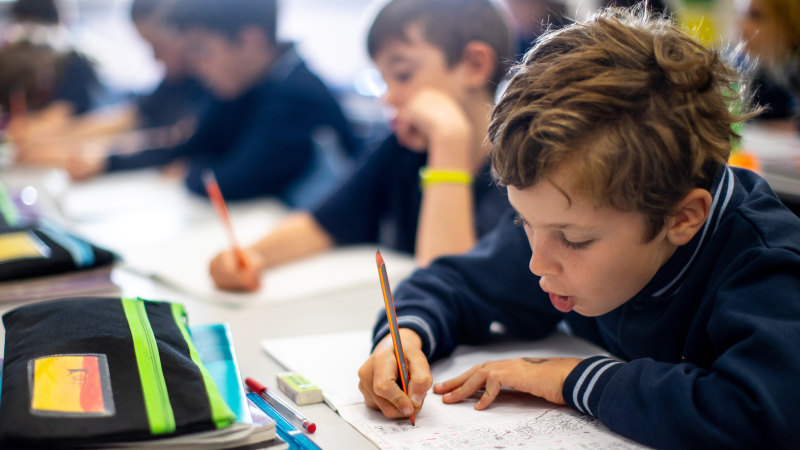Save articles for later
Add articles to your saved list and come back to them any time.
The reading standards of Victorian students could noticeably decline unless the state government adopts a consistent teaching approach to the key learning skill, experts have warned.
NSW, South Australia and Queensland have now all backed a phonics-based approach, while Victoria continues to allow schools to “choose their own adventure” when it comes to their literacy teaching strategy.
The Victorian government needs to offer more explicit guidance to schools on literacy or risk declining results, academics say.Credit: Simon Schluter
A group of 45 academics delivered a joint letter to state and federal governments this week, calling for immediate action to provide evidence-based science of reading instruction to stem the flow of students who leave primary school without proficient reading skills.
Academic Pamela Snow, professor of cognitive psychology at La Trobe University’s School of Education, said there were still significant gaps between reading research and classroom teaching, and governments needed to be more deliberate in guiding schools to adopt best practice.
The Victorian government said schools were doing an “outstanding job” at teaching students literacy, as evidenced by the highest year 3 students reading scores in the country in this year’s NAPLAN assessments.
But Snow said NAPLAN was not a high benchmark, and she expected Victoria’s performance would decline over time if it didn’t follow the lead of other, more prescriptive, states.
Snow said it was impossible for the government to determine how much of Victoria’s current success was attributable to schools moving independently to a phonics-based approach, parents paying for tutors or the state’s broader social advantage.
“Because we’ve devolved autonomy down to individual schools, we’re tolerating high levels of variability,” she said. “We don’t tolerate high levels of variability in health. Why would we tolerate high levels of variability in education?”
Almost one third of Australian children and just over a quarter of Victoria’s students failed to meet new proficiency standards for literacy in this year’s NAPLAN (National Assessment Program – Literacy and Numeracy) test.
Unlike other states that have openly backed a phonics-based approach, the Victorian government allows primary schools to choose their own literacy strategy.
As a result, some schools have adopted “science of reading” principles, which involve systematic synthetic phonics instruction and decodable readers in the early stages, to teach children the sounds of the English language and the letter combinations that make them.
Others choose a “balanced literacy” approach, which combines some phonics with whole language practices that teach children to read using full words and predictable texts that encourage them to guess words.
Churchill Primary principal Jacquie Burrows has led one of the state’s reading success stories after switching the small Latrobe Valley school to a science of reading approach in 2018.
Within three years, most of her students went from underperforming to above average NAPLAN results. She now leads regular tours from school leaders keen to replicate her success.
Burrows said the government should eliminate practices that don’t align with reading science research.
“In our experience, when we were teaching whole language/balanced literacy with fidelity our results were poor and we had high levels of students with dysregulated behaviour,” she said. “Our shift to aligning our practice with science of reading research is what improved our academic results and student engagement.”
An Education Department spokesperson said every school was required to have a four-year plan reflecting priorities and goals. They said the department provided clear advice to schools on evidence-based practices.
Snow said the government needed to distil the latest research and direct schools, instead of offloading responsibility and allowing them to choose their own path.
“You can’t just put a whole lot of … teaching approaches out there and say, okay, go fish, use whichever ones appeal to you,” she said. “That’s not ensuring high-quality reading instruction for all.”
The academics’ letter calls for six policy reform initiatives including embedding evidence-based approaches in initial teacher education and professional development, and establishing new proficiency targets in the next National School Reform Agreement, due to be delivered at the end of October.
It also calls for national implementation of the grade 1 phonics check and screening in the first year of high school to identify students who were struggling or falling behind.
Victoria introduced a mandatory phonics test this year to screen the reading ability of all grade 1 students but critics of the $11.3 million tool say it is too brief to be useful and has made it impossible to compare the state’s results to other jurisdictions.
The Victorian Opposition has pledged to establish an evidence-based learning framework, including resources for teachers and phonics screening, in all schools if elected.
“The Labor Government should put an end to their phonics-phobia and instead put in place the best evidence-based learning and teaching practices available to them to ensure every Victorian student is taught to read and write,” education spokeswoman Jess Wilson said.
Get the day’s breaking news, entertainment ideas and a long read to enjoy. Sign up to receive our Evening Edition newsletter.
Most Viewed in National
From our partners
Source: Read Full Article



